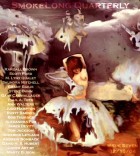Where did the idea for “Salt” come from?
The night of the blackout in the summer of 2003, I actually did have to walk over 80 New York City blocks back to my apartment, and then go up 26 flights of stairs, and by the time I was in my apartment, I was so thirsty that I started drinking all the beer in my refrigerator. I thought that this was a pretty lonely thing to be doing, and then I figured that people were either going to be spending this blackout with the ones they loved or spending the blackout wishing they were with the ones the loved. So, I’d wanted to write about that feeling for a while, and then I had another idea about the salt shaker, which was such a non-lonely sentiment. I thought the two topics would work well together.
How do you find time to write?
I don’t. I took a year off after medical school to work on my writing which didn’t pan out to very much, mostly because it was such a strange sensation to actually have time to write. I write at nights or on weekends if I have time off, but these moments seem to come less and less often. There’s an Arthur Miller quote that I used to have on my computer about how most of his writing is done when he’s shaving or driving or doing some other daily task, and not necessarily when he’s sitting at a desk, and that’s sort of what keeps me going, because I’m always thinking about what I’d like to write.
You lived in New York for a while. How did that affect your writing?
New York was a great place to live, but I usually don’t write about the city itself. Probably because it’s been done so many times by such great writers that I don’t feel like I have much to add.
What experiments would you like to see more of in the world of literature? What risks would you like to take as a writer?
I can tell you what I’d like to see less of—stories about Eastern Europe. I’m kidding, because I’ve read some amazing stories in the past year that took place in Eastern Europe, but I’m also not kidding, because there seems to be an over-representation of stories about Ukrainian villages among published pieces. I guess I’d like to see more “literary” writers try genre writing, if I had a wish. I went through a science fiction phase last spring and think I produced some of my better, albeit unpublishable, writing. I’m afraid there’s not a huge market for novellas about LASIK procedures gone awry.
Are there any stories or authors that you study again and again?
I read Richard Yates’s books over and over and over again. His sentences are flawless, but more importantly for me (because I don’t think I was blessed with the talent to write flawless sentences) is the overwhelming honesty that permeates his writing. There’s an exciting feeling I get reading something great (and this always happens with Yates), the feeling that this is a story that the author just HAD to tell the world. That’s what I hope people think when they read something by me.



 The core workshop of SmokeLong Fitness is all in writing, so you can take part from anywhere at anytime. We are excited about creating a supportive, consistent and structured environment for flash writers to work on their craft in a community. We are thrilled and proud to say that our workshop participants have won, placed, or been listed in every major flash competition. Community works.
The core workshop of SmokeLong Fitness is all in writing, so you can take part from anywhere at anytime. We are excited about creating a supportive, consistent and structured environment for flash writers to work on their craft in a community. We are thrilled and proud to say that our workshop participants have won, placed, or been listed in every major flash competition. Community works.